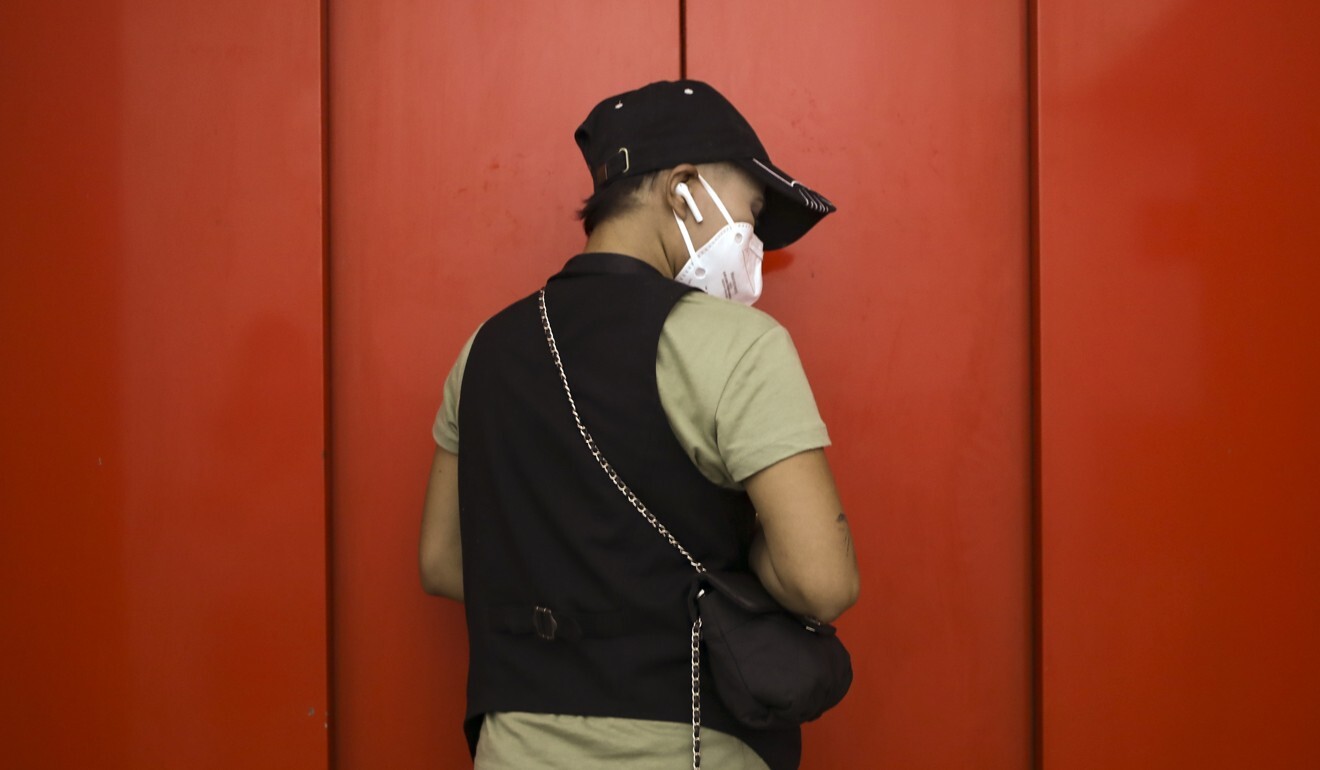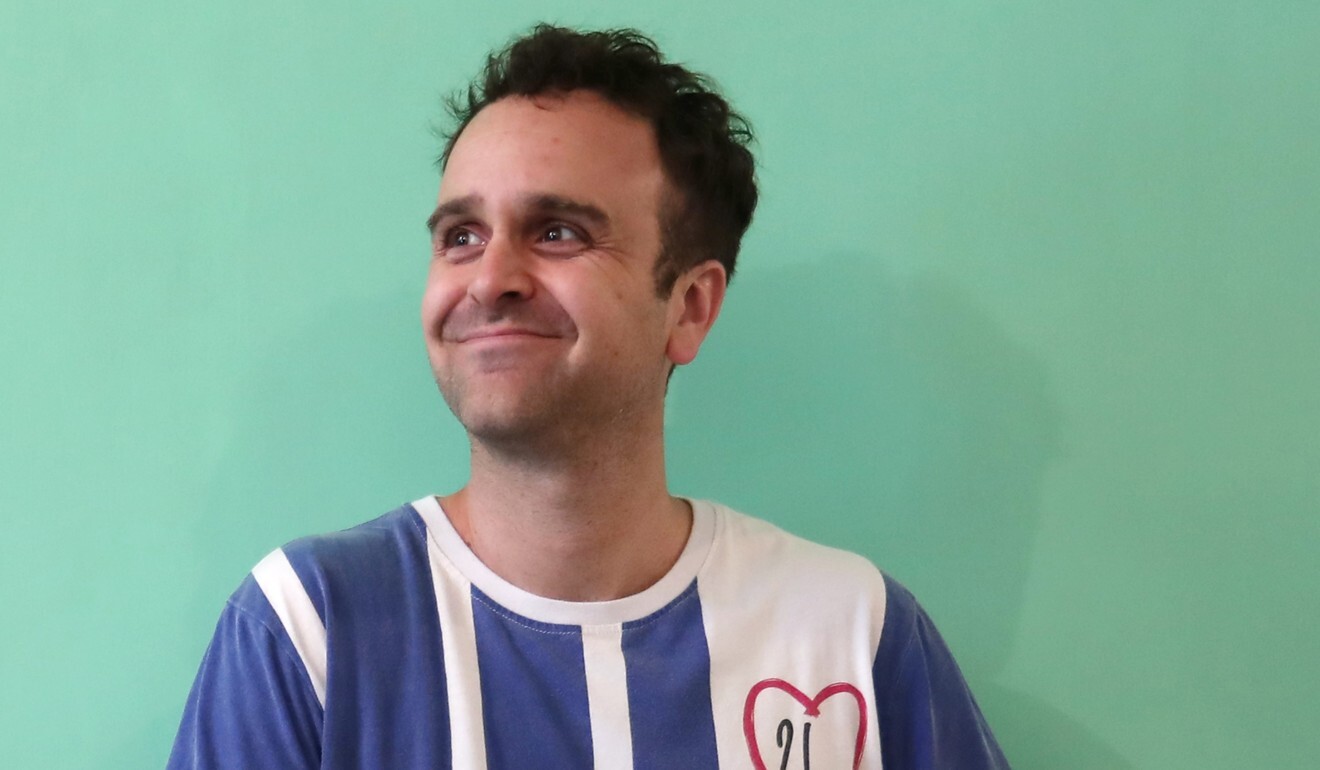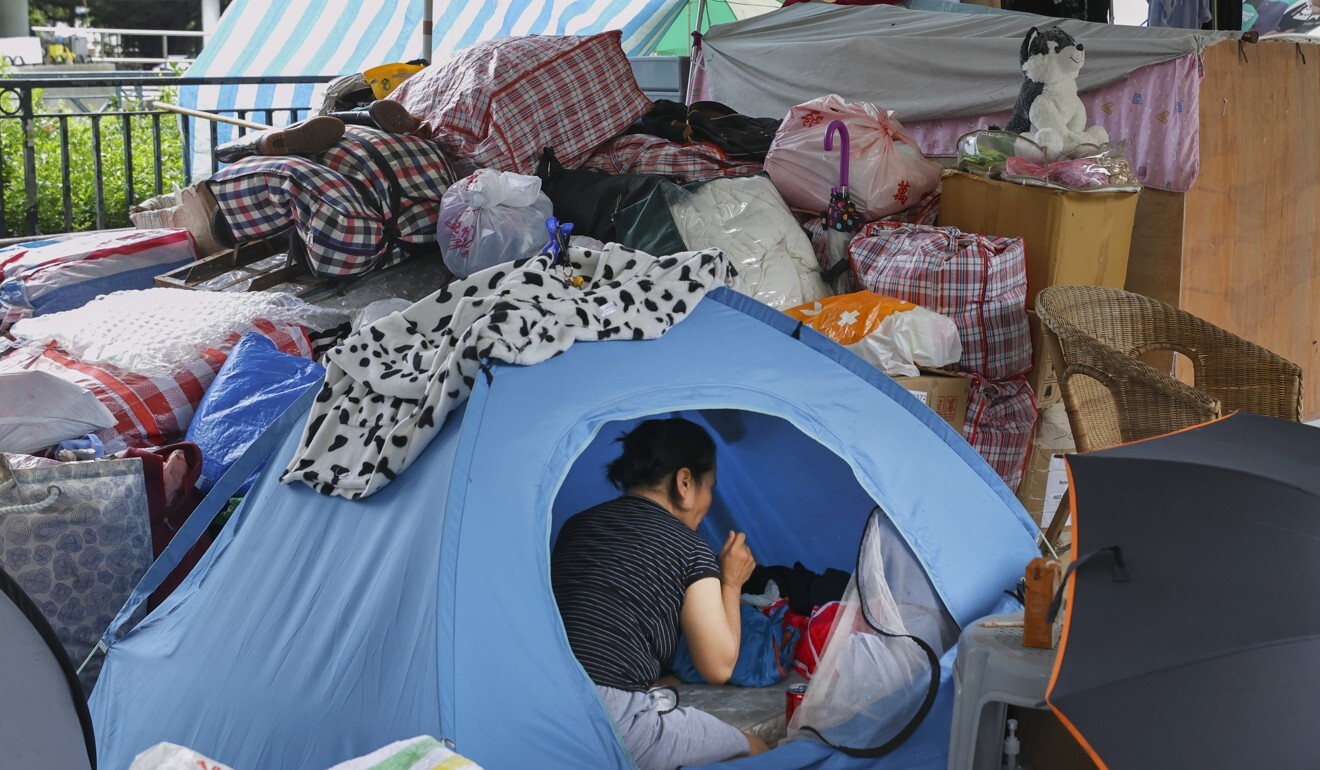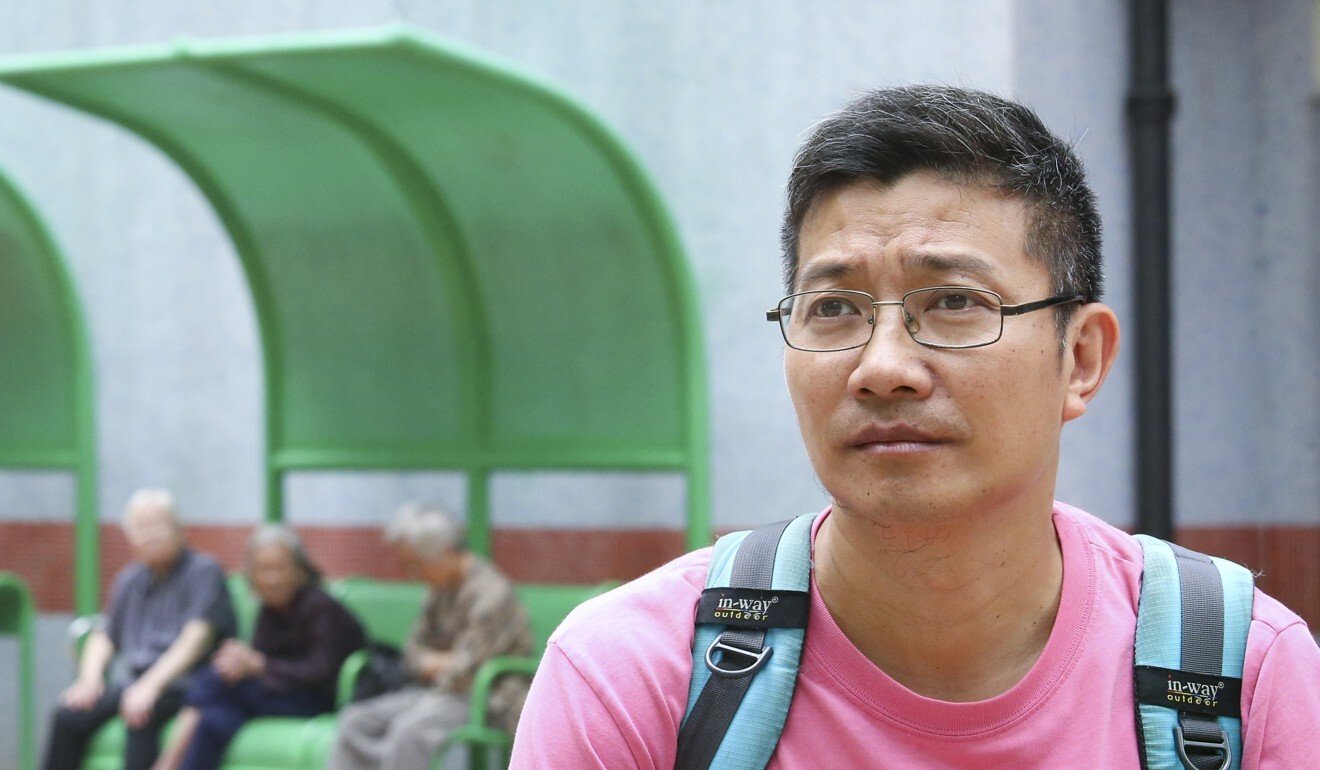
Hong Kong’s rising number of homeless women struggle on the streets, sleeping rough, trying to make ends meet
- Agencies note ‘alarming’ rise in number of homeless women, call for more measures to help them
- Finding a safe spot to sleep, away from unwelcome attention, a major challenge for street women
May* had finally relaxed enough to fall asleep in a park in Mong Kok, when she jolted awake to discover a man had crept up to lie beside her.
“I was very scared. Why sleep next to me when there is so much space?” she recalls.
It was not the only unwanted encounter she experienced in the park where she has slept since April.
On at least three occasions, she says, she screamed when men exposed themselves in front of her.
Jobless and 49, she says she told a social worker, who encouraged her to report to police if it happened again.
“Although I am homeless, I am not brave,” she says, her voice trembling. “I don’t know how to handle these things.”

May gave up her public housing flat seven years ago, because she had a job on an outlying island that provided housing in a dormitory. But she lost her job about five years ago and has been living on the streets on and off since then.
Unmarried and estranged from her siblings, she says she has no one to turn to.
Most recently, she shared a flat in Prince Edward with eight men and two women. It was a “coffin home”, with tiny living spaces stacked one above the other, which typically rent for between HK$1,000 (US$128) and HK$4,000 per month.
She returned to sleeping rough because many of the men wore only their underwear around the tiny flat.
Finding a safe space to sleep is a common challenge for homeless women like May. New figures show that their number has tripled from 43 in 2014 to 171 this year.
Call for action as rising temperatures hit poorest Hongkongers hard
The number of registered homeless people increased from 787 in 2014 to a record high of 1,562 at the end of June. The percentage of women among them almost doubled from 5.5 per cent in 2014 to 10.9 per cent this year, according to official data.
However, experts say the real number of homeless is likely to be much higher, with thousands of tenants living in tiny subdivided flats or “caged” homes preferring to rough it out on the streets.
There are only 31 places for women among the 222 emergency and short-term lodgings in the city, which one NGO says fails to meet the needs of homeless women.
From October last year to March this year, the Hong Kong Association of Community Organisations interviewed 15 women and found that four in five needed emotional support, about half needed psychiatric treatment and a third had drug addiction issues.
With services for the homeless focused mostly on men, the group says Hong Kong needs to do more for homeless women and recommends that the government set up a team dedicated to supporting them.

‘So hard to stand up again’
After too many arguments with her three adult daughters in their public housing flat, Ivy, who asked to go by her first name, began sleeping in parks in Tsim Sha Tsui last year.
The diminutive, wiry woman with her streaked grey and black hair pulled into a ponytail told the Post she was always worried that someone would take away her belongings, and kept her phone and wallet tucked in her pants when she slept.
The 63-year-old collected cardboard to sell for a few dollars and received free meals from charities and church groups.
Suffer the children: abuse cases in Hong Kong up sharply during Covid-19 pandemic
Men were a problem, she says, always trying to start a conversation with her and her women friends, sometimes using vulgar language and forcing them to move on.
“We want to be free, but worry that the men may follow us, so it is hard to sleep,” she says.
Through ImpactHK, an organisation that helps the homeless off the streets and into employment, she has since found a full-time job in a cafe and is living in a guest house.

The organisation is also helping Ann, a 36-year-old Filipino who moved to Hong Kong 15 years ago with the Chinese national she met in Manila and married.
The couple divorced in 2013, with her ex-husband having custody of their son. Soon after, she began using Ice, also known as crystal meth.
She moved in with a boyfriend, but when they broke up, she found herself homeless seven years ago.
Dressed in black, with her short hair under a black baseball cap, Ann recalls the days she spent being homeless in North Point, saying: “If you sit in a doorway, people ask you, ‘Why are you here?’”
ImpactHK, which has a drug rehabilitation programme, has taken Ann into its community helper programme. Six days a week, she is given small responsibilities to help her work towards finding full-time employment.
“I want to start my life. I want to have a job and a home to live in,” she says. “Once you are living down, you cannot stand up. It is very difficult.”

Jeff Rotmeyer, founder of ImpactHK, says he is alarmed at the rising number of younger homeless women over the past year.
He estimates that around a third of the roughly 300,000 people living in coffin cubicles, caged homes, illegal rooftop dwellings and partitioned flats are women who can barely make ends meet.
“One small hiccup, like a missed pay cheque or government support, and they could easily get pushed out of those spaces onto the streets,” he says.
Rotmeyer says it is more dangerous for homeless women.
“Women on the streets are vulnerable and can be taken advantage of quite easily because they are desperate for safety, support and care,” he says.

Before the Covid-19 pandemic arrived, hundreds of people slept overnight at the 24-hour outlets of McDonald’s restaurants.
Society for Community Organisation (SoCO) community organiser Ng Wai-tung says that has contributed to more women sleeping on the streets, as many of them felt safer spending their nights in the restaurants.
In a 2018 survey, the group found that 16 per cent of the 448 McRefugees at 109 outlets were women.
Ng says while he is not aware that sexual harassment of women is common, when it does happen, some homeless women worry that the police will not take their complaints seriously.
“So they will just ignore it or feel uneasy to complain,” he says.
Hong Kong: where living rough is better than a caged home, even during Covid-19
The rise in unemployment is another factor behind the increase in homeless women. The proportion of jobless women has increased from the pre-pandemic level of 2.4 per cent to 4 per cent.
Although the overall unemployment rate has fallen to 5 per cent in the three months to the end of July, there are still about 198,400 people out of work, says Peace Wong Wo-ping, chief officer of social security and employment of the Hong Kong Council of Social Service.
He adds that for some, it is only a matter of time before they go from being jobless to homeless.
“You will use your savings first and then, once you cannot pay rent, you could end up on the streets,” he says.
Hong Kong does not have an unemployment insurance system. The jobless can apply to the Social Welfare Department for the Comprehensive Social Security Assistance (CSSA) scheme, which gives monthly cash handouts to those in financial need.

A mental health crisis too
Kit*, 49, says her life turned upside down in 2018 when she was arrested and detained on a drug charge. Although she was found innocent and released the following year, she lost her public housing flat and ended up on the streets.
She recalls being so afraid at first, when men came to talk to her, that she hid in a shopping centre toilet one night just to get a few hours’ rest.
She spent a year sleeping under bridges, in McDonald’s outlets, on the beach and in public toilets, trying to hold down any job she could get.
She says she tried to apply for a job as a cleaner at a fast-food restaurant, but when the interviewers asked where she lived and learned she was homeless, they ripped up her application.
Police explanation for speedy operation against street sleepers rejected
Kit, who never married, has two young sons from previous relationships and both are in foster care. She also has schizophrenia.
She says she feels safer when her boyfriend of five years, Fung*, 38, is with her. During part of the time she was homeless, he was in jail for a gambling offence.
“I need him to protect me and remind me to take my medicine and take care of me,” she says.
The couple moved into a subdivided unit in Tsim Sha Tsui last month, with SoCO helping to cover the rent of HK$5,800 a month.
Their tiny space has a double bed, a washing machine and a small refrigerator, with every surface covered with crockery, toiletries, instant coffee and noodles.
But Kit says she is happy to finally have a stable roof over her head. She and Fung, who is jobless, hope to find part-time work or obtain government help to continue living there.

Experts say that many homeless women are living with serious mental health problems.
Social worker Olivia Chan Man-shan says most of the women she has seen over her five years of doing outreach at the Christian Concern for the Homeless Association suffer from mental illness.
“Because of their mental health issues, it might prevent them from getting along with their families, getting a job and communicating with others. So they stay alone,” she says.
Rotmeyer says: “What we see on the streets is a mental health crisis.”
Many of the women have mental health issues, he adds, but do not receive treatment, with some being afraid to go to hospital.
While there is a shortage of places for women in homeless shelters, SoCO‘s Ng says some homeless women resist going to the shelters because of the lack of privacy and having to live in dormitories.

The government shelters also have separate dormitories for men and women, and some homeless women with a partner prefer to stay on the streets than be cut off from their emotional support.
Ng hopes that besides providing more spaces for longer than the current maximum term of six months, hostels will allow couples to stay together in a room.
The hostels could also provide psychiatric experts for residents to receive help, he says.
Although her boyfriend Fung provides much-needed support, Kit agrees that women who resort to sleeping on the streets need more help.
“There are cancer patients who are taken care of by certain government departments. I really wish the government could have a department to help those of us who are ignored but scared to voice our concerns,” she says.
Additional reporting by Kathleen Magramo, Harvey Kong and Sammy Heung
*Names changed at the interviewees’ request

